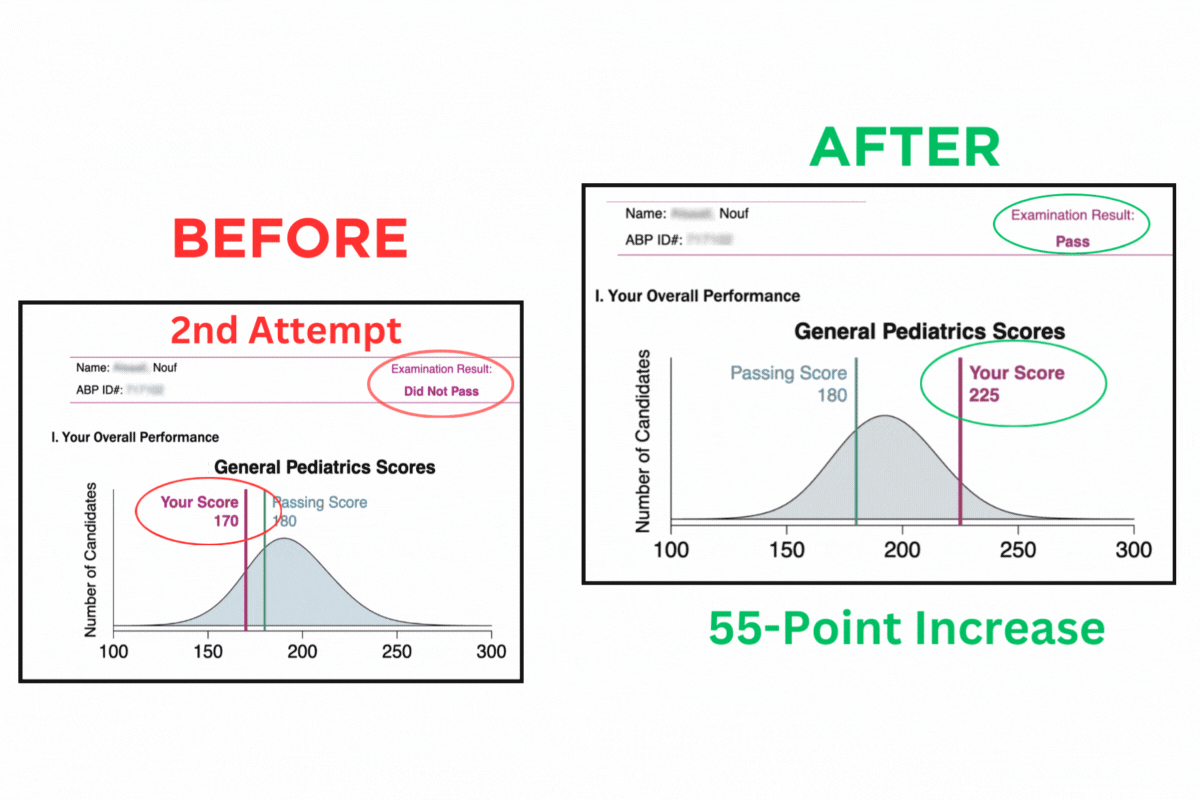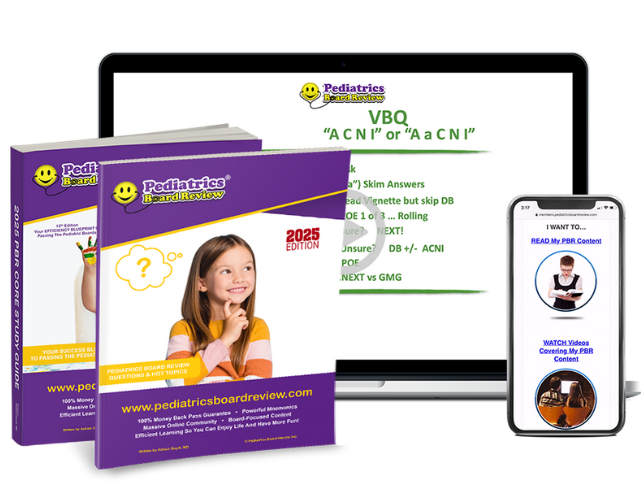Failed Pediatric Board Exam? We Have Strategies for Improving Pediatric Board Scores
If you failed the pediatric boards, it can be a devastating blow for pediatricians. The pressure to take the pediatric board exam can be immense. That is why Ashish Goyal, MD founded the Pediatrics Board Review® (PBR) after he failed the pediatric boards on his first attempt. Failing the pediatric board exam can definitely shake the confidence of pediatricians and their dreams of becoming board-certified pediatricians. Passing the boards is a crucial milestone for pediatricians, as it is a tremendous factor in their career advancement and their eligibility to practice at reputable hospitals and group pediatric practices.

Stay tuned to discover effective strategies to regain your confidence, enhance your knowledge, and prepare yourself for passing your pediatric boards. We have plenty of resources for pediatricians who have failed the pediatric boards and strategies for improving pediatric board scores.
Implications of Failing the Pediatric Boards
Career Setbacks and Concerns
Failing the pediatric board exam can temporarily delay career advancement for pediatricians seeking their board certification. While disappointing, setbacks are an expected part of professional growth. By learning from this experience, pediatricians can develop greater knowledge and skills that allow them to better serve patients in the long run. So, don't be discouraged if you failed the pediatric boards on your first attempt. Take a few minutes to reflect on the questions you struggled with and use them as an opportunity to improve. From first-time test-takers to those who have previously failed the pediatric boards up to 9 times with other board review companies, all have found success through PBR. The key is to maintain positivity and focus on continuous improvement.
Emotional Challenges and Self-Doubt
If you failed the pediatric boards, it can take an emotional toll on pediatricians. It's natural to feel disappointed, frustrated, or even embarrassed about a failed pediatric board exam. This can be especially challenging for pediatricians who have worked hard and prepared diligently. However, it's important to remember that your pediatric board results are not a reflection of your intelligence or worth as a pediatrician. Instead, they provide valuable feedback that can help you identify areas for improvement and guide your future learning. Self-doubt may creep in, making you question whether you're cut out for pediatrics or medicine in general.
During this time, it's crucial to acknowledge and process these emotions. It's important to ask yourself questions about the test and evaluate your scores. ABP is a key factor to consider. Surround yourself with supportive friends, family, and especially mentors who can provide encouragement and remind you of your strengths. These individuals can be instrumental in answering any questions you may have about the pediatric boards and helping you improve your scores. Remember that failure in the ABP test is not uncommon nor indicative of future success; many successful board-certified pediatricians have faced similar setbacks with their scores but persevered through proper guidance. There are plenty of helpful resources, study guides and test-taking strategies for improving pediatric board scores.
Opportunities for Growth and Improvement
While a pediatrician that failed the pediatric boards might feel like its a major setback initially, it also presents opportunities for personal growth and improvement. It's important to address any lingering questions about the ABP Initial Certification exam and develop a plan to tackle it successfully in the future. Take this experience as a chance to reflect on areas where you need further development and focus your efforts on strengthening those skills. Ask yourself questions about your development and use the ABP framework to guide your efforts.
Consider seeking additional resources such as study guides, online courses, or tutoring sessions to enhance your knowledge base in specific areas of pediatrics. Use this setback as motivation to work harder and prove yourself when retaking the exam. A failed pediatric board exam gives you firsthand experience with resilience and perseverance. It teaches you how to bounce back from failure and continue pursuing your goals despite setbacks. These qualities are invaluable in the medical field, where challenges are bound to arise throughout your career.
Strategies for Improving Pediatric Board Scores
Identifying areas of weakness and developing a targeted study plan
So, you've failed the pediatric boards. Don't worry, it happens to the best of us! The first step towards success is identifying the areas where you struggled. Take some time to reflect on your performance and pinpoint the specific topics or concepts that gave you trouble. Once you have identified these areas of weakness, you can develop a targeted study plan to address them head-on.
Here's what you can do:
- Break down the content: Divide the subject matter into smaller, manageable chunks. This will help prevent overwhelm and allow for focused studying.
- Prioritize weak areas: Determine which topics require more attention based on their weightage in the exam. Focus on these areas first before moving on to others. This is one of the most important strategies for improving pediatric board scores.
- Seek additional resources: Look for study materials, textbooks, online courses, or video tutorials that specifically cover the topics you struggled with. These resources can provide alternative explanations and examples that may resonate with your learning style.
Utilizing resources such as practice exams and study guides
To improve your chances of success in your retake, it's essential to utilize all available resources at your disposal. For pediatricians that failed the pediatric boards, practice exams and study guides are valuable tools that can help reinforce your understanding of key concepts and familiarize yourself with the format of the test and how to answer board style questions.
Consider these options:
- Practice exams: Take advantage of practice exams designed specifically for pediatric boards preparation. These mock tests simulate real exam conditions and allow you to gauge your progress while identifying areas that still need improvement.
- Study guides: Invest in reputable study guides that provide comprehensive coverage of the exam content. These guides often offer tips, mnemonics, and concise summaries that can aid in retention and recall.
Seeking mentorship or tutoring to enhance understanding

Here's how it can help:
- One-on-one guidance: Working with a mentor allows for individualized attention and the opportunity to ask questions and clarify doubts.
- Expert insights: Mentors, like Dr. Goyal, who have successfully passed the pediatric boards can offer valuable insights into effective study strategies for improving pediatric board scores, exam-taking techniques, and content review.
Implementing effective time management techniques
Time management plays a crucial role in maximizing your study efforts and ensuring you cover all necessary material before the retake. By implementing effective time management techniques, you can make the most of your available study hours without feeling overwhelmed or burnt out.
Consider these tips:
- Create a study schedule: Develop a structured study plan that allocates specific time slots for each topic or subject area. Stick to this schedule as much as possible to maintain consistency.
- Use timers: Set timers for focused study sessions, allowing yourself short breaks in between to rest and recharge.
- Prioritize high-yield topics: Identify the key concepts that are more likely to appear on the exam and allocate more time towards mastering them.
- Avoid multitasking: Focus on one topic at a time rather than trying to juggle multiple subjects simultaneously.
Remember, failing the pediatric boards doesn't define your abilities as a future pediatrician. Following strategies for improving pediatric board scores with determination, targeted studying, and strategic planning, you can improve your chances of success in your retake of the pediatric boards!
Addressing the Perception of Failure
Challenging societal stigmas surrounding exam failures can be tough, but it's essential to remember if you failed the pediatric boards that doesn't define your worth or competence as a pediatrician. It's crucial to cultivate self-confidence despite external judgment and focus on personal growth rather than dwelling on past failures.
Cultivating Self-Confidence Despite External Judgment
It's easy to let self-doubt creep in. However, it's important to remember that even the most successful pediatricians have faced setbacks along their journey. Instead of letting negative thoughts consume you, focus on building resilience and cultivating self-confidence.
One way to do this is by reframing failure as an opportunity for growth. Rather than viewing a failed pediatric board exam as an issue of incompetence, see it as a chance to learn from mistakes and improve your knowledge and skills. Embrace a growth mindset that values effort and perseverance over immediate success.
Communicating Openly with Colleagues, Mentors, and Employers

Reach out to trusted colleagues or mentors who can provide advice based on their own experiences. They may offer insights into specific study strategies or resources that could help you better prepare for future attempts at the pediatric boards. Discussing your situation with employers can foster understanding and create opportunities for additional support during this time.
Focusing on Personal Growth Rather Than Dwelling on Past Failures
While it's natural to feel disappointed after failing an exam like the pediatric boards, dwelling on past failures won't help you move forward. Instead of fixating on what went wrong or comparing yourself unfavorably to others who passed, shift your focus towards personal growth and improvement.
Identify the areas where you struggled the most during the exam and use that information to ask yourself targeted questions. What specific topics or question types were challenging? Were there any time management issues? By pinpointing these areas of weakness, you can create a plan to address them effectively in future study sessions.
Remember, everyone's journey is unique, and success is not always immediate. The pediatric boards are known for their difficulty, with multiple hard questions designed to challenge even the most knowledgeable examinees. Highlight your progress and celebrate small victories along the way as you work towards achieving your goal.
Crafting an Effective Study Schedule

Balancing Work-Life Commitments
When creating your study schedule, it's crucial to consider your work-life commitments. You don't want to overload yourself with studying and neglect other aspects of your life. Find a balance that allows you to allocate dedicated time for studying while still fulfilling your responsibilities at work or school.
Allocating Time for Each Subject Area
The pediatric boards cover various subject areas, so it's important to allocate dedicated time for each one. Divide your study sessions into specific blocks for topics like cardiology, pulmonology, infectious diseases, and more. This way, you can ensure comprehensive coverage of all the content outlined in the examination.
Incorporating Regular Breaks
Studying for long periods without breaks can lead to burnout and decreased focus. It's crucial to incorporate regular breaks into your study schedule. Take short intervals between study sessions to relax and recharge. This will help maintain your concentration levels and prevent mental fatigue. PBR offers personalized study schedules for pediatricians based on their
Adapting Your Study Schedule Based on Learning Style
Everyone has a unique learning style, whether it's visual, auditory, or kinesthetic (hands-on). Consider how you learn best when crafting your study schedule. If you're a visual learner, incorporate diagrams or flashcards into your sessions. If you're an auditory learner, find audio courses for the pediatric boards and listen .
Utilizing Practice Questions and Core Study Guides
Practice questions are invaluable resources when preparing for exams like the pediatric boards. Incorporate them into your study schedule regularly as they help reinforce knowledge and familiarize you with exam-style questions. Make use of core study guides recommended by your program or trusted sources to ensure you cover all the essential topics.
Flexibility and Adaptability
Remember that your study schedule should be flexible and adaptable. As you progress through your studies, you may identify areas where you need more time or additional resources. Be open to adjusting your schedule accordingly to address any weaknesses or challenges you encounter along the way.
By crafting an effective study schedule that balances work-life commitments, allocates time for each subject area, incorporates regular breaks, adapts to your learning style, and utilizes practice questions and core study guides, you'll set yourself up for success on exam day. Remember to stay consistent with your schedule and track your progress regularly to gauge improvement in exam scores.
Moving Forward from Failure

Remember that failing doesn't define you as a person or a professional. It's merely a stepping stone on your journey to success. Embrace this experience as an opportunity for growth and learning. Just like a butterfly emerges stronger after struggling to break free from its cocoon, you too can rise above this challenge.
Now is the time to dust yourself off and get back in the game. Develop a clear plan of action based on the strategies outlined earlier. Create a study schedule that works for you and stick to it religiously. Seek support from mentors, colleagues, or online communities who can provide guidance and encouragement along the way. For more strategies for improving pediatric board scores, check out our blog on test-taking strategies and learn about how Dr. Goyal previously failed the pediatric boards and what he did to overcome my fear of the pediatric boards.
FAQs
Can I retake the pediatric boards?
Yes, you can definitely retake the exam if you failed the pediatric boards. Many professionals have faced setbacks before achieving their goals. Take some time to reflect on what went wrong in your previous attempt and devise a plan to improve your weaknesses.
How long should I wait before retaking the exam?
The waiting period between exam attempts varies depending on your specific situation and jurisdiction requirements. Consult with your local medical board or certification body for accurate information regarding when you can retake the pediatric boards.
Are there any additional resources I should consider using?
Absolutely! In addition to studying materials provided by your medical school or residency program, consider exploring online resources such as question banks, review courses, and study guides specifically designed for pediatric board preparation. These resources can provide valuable practice questions and targeted content review.
Should I disclose my previous failure when applying for jobs?
While it's important to be transparent and honest in your job applications, disclosing that you failed the pediatric boards is a personal decision. Consider how it may impact your chances and weigh the pros and cons. If you choose to disclose, emphasize what you have learned from the experience and how it has made you a stronger candidate.
How can I stay motivated throughout my journey?
Staying motivated after you failed the pediatric boards can be challenging, but it's crucial for success. Set small, achievable goals along the way and reward yourself when you accomplish them. Surround yourself with positive influences, whether it's supportive friends or mentors who believe in your abilities. Remember why you pursued pediatrics in the first place and let that passion fuel your determination to succeed.

 A failed pediatric boards attempt is devastating. Although I'm now the author of the Pediatrics Board Review (PBR) study guides, I failed the American Board of Pediatrics (ABP) initial certification exam the first time I took the boards. I know what you're thinking, but before you throw yourself back into the depths of studying, here are two things you need to understand:
A failed pediatric boards attempt is devastating. Although I'm now the author of the Pediatrics Board Review (PBR) study guides, I failed the American Board of Pediatrics (ABP) initial certification exam the first time I took the boards. I know what you're thinking, but before you throw yourself back into the depths of studying, here are two things you need to understand:




 Passing the the pediatric boards is challenging, but it's far from magic. In this article I'm going to introduce you to the 3 main areas you must focus on to pass the boards. If you don't, then even as a good pediatrician you will be at high risk for failing the boards.
Passing the the pediatric boards is challenging, but it's far from magic. In this article I'm going to introduce you to the 3 main areas you must focus on to pass the boards. If you don't, then even as a good pediatrician you will be at high risk for failing the boards.